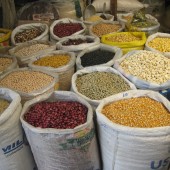
I have a confession to make. Three years ago, when I took on this revered post as editor of the soon-to-be-inaugurated Journal of Sustainability Education, I wasn’t too sure what, if anything, “sustainability” was. Not that I hadn’t spent the better part of a decade thinking about it, listening to what others had to say about it, […]
Continue Reading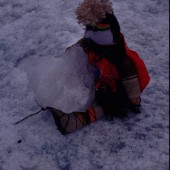
The high Andean Incan mummies represent an astounding feat of cultural preservation that reveals much about the peoples who left them, and their discovery is a tribute to the valor of the modern-day high-altitude archaeologists who have recovered, studied and preserved them. The intricate and delicate interconnectedness of the mummies, the modern cultural practices that descend from their original cultures, and the effect of climate change on the status of high altitude ice bring broad-scale lessons to those interested in the environmental and cultural landscapes of sustainability.
Continue Reading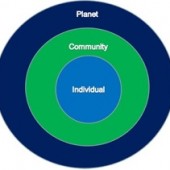
To most individuals, sustainability means environmentalism. This unfortunate approach to the current global crisis has ignored a more realistic systems approach, that sustainability includes social, cultural, economic, individual, and technical components. Even more tragic is our inability to align our very admirable values related to sustainability with our demonstrated and often
unenlightened self-interest and partisan selfishness, for it is individual behavior that creates the foundation for action in all other contexts in sustainability and potentially guides our ability to work with one another to make life-affirming decisions. This paper addresses the tragic gap between what we profess to value and the collective behaviors we demonstrate.
Continue Reading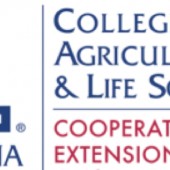
While a number of universities across the nation have sustainability education programs, land grant universities and their Cooperative Extension departments are in a particularly advantageous position to foster sustainability education. At the University of Arizona (UA), this is being accomplished through its Cooperative Extension cadre of education programs in agriculture; youth development; natural resources; horticulture; family, consumer and health sciences; and community and economic development. A working group within UA Cooperative Extension has been tasked with evaluating the reach of sustainability concepts while developing opportunities for its faculty to further integrate sustainability education into its programs, such as through student externships. Preliminary evaluation results indicate that Extension’s programs positively embody the concepts of sustainability without creating the need for new, deliberate programming around sustainability education.
Continue Reading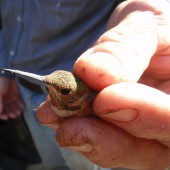
This paper explores examples of the ways that indigenous and traditional stories are tools to guide humans through complex interactions with ecosystems and to remember our shared fate with the land. Traditional stories are not mere superstition or poor substitutes for scientific thinking; they are made up of extremely complex, finely coded information on human subsistence and infused with elements that ensure they continue to be told and remembered
Continue Reading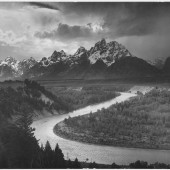
This article provides an overview of the primary themes embedded within bioregionalism. The framework for the paper is built around the CIDER acronym—compiled by the author—and includes: Connecting to our “life place,” inquiring into the interplay of cultural and ecological landscapes within the bioregion, decentralizing, emphasizing natural boundaries, reinhabiting as a culminating concept and practice. The CIDER acronym is then discussed in the context of applying bioregional thinking and practice to the broad field of education.
Continue Reading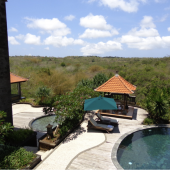
This article offers a brief summary of sustainability in general in the hospitality and tourism industry and introduces content information related to sustainability that may be helpful for use in hospitality and tourism education. Specifically, the paper focuses on the following question: What is the emphasis of sustainability education in the hospitality and tourism field? Themes in sustainability education in the lodging, meetings and events, and food and beverage sectors are identified, applications of sustainability practices in hospitality and tourism operations are introduced, and views about the future direction of sustainability education in this field are provided.
Continue Reading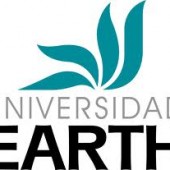
The purpose of this paper is to propose environmental education and eco-literacy as components of education for sustainable development through the examination of an eco-literacy program offered by EARTH University in Costa Rica to rural community public schools. To illustrate these components we examine the development of a program/curriculum used in 17 elementary schools. We draw two important conclusions from our examination. First we found that external national political, social, and economic forces were important to the program’s success. Secondly we illustrate the importance of developing and programs that address the specific needs and issues of the local region.
Continue Reading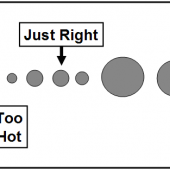
Sustainability education typically focuses on sustaining life, ecosystems, and humans here on Earth. However, important insights come from considering life beyond Earth. This article presents several ways to teach astrobiology – the study of life in the universe – in an undergraduate sustainability course. The concept of habitable zones offers perspective on the temporal and spatial scales of sustainability on Earth and bujj78eyond. The prospects for long-term sustainability in the universe suggest expanded conceptualizations of sustainability, leading to a present-day focus on the risk of certain global catastrophes. Finally, the possibility of extraterrestrial life and the fact that none has yet been observed gives us new ways of thinking about our own lives on Earth. In sum, astrobiology offers an understanding of how our current sustainability challenges fit within the grander scheme of the universe. This understanding is of great value to the sustainability classroom.
Continue Reading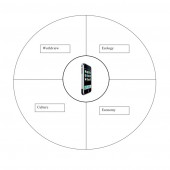
As a professor of undergraduate media studies, I have attempted to bridge media education and ecoliteracy by developing an experimental media education approach called Ecomedia Literacy. The framework attempts to balance the strengths of media studies with the concerns of education for sustainability. This paper documents a specific case study in which I introduced sustainability themes into an undergraduate digital technology and culture course by using the Ecomedia Literacy framework.
Continue Reading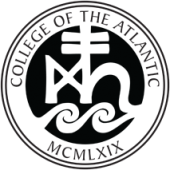
Mitigating climate change is among the most urgent challenges humans face. However debate regarding sustainable energy and options for reducing carbon dioxide emissions tend to be polarizing and frequently unproductive. Too often facts are lost in jargon and numbers that have little meaning for many, including policy makers. Further compounding the problem is the lack of a tangible connection for most citizens between fossil fuel use and environmental degradation. This lack of understanding limits our ability to have sensible discussions about our climate and energy future. A human ecological approach to teaching energy literacy is essential to ensure responsible environmental stewardship in the age of climate change. A powerful and effective way to address this is through project-based learning that helps prepare students, across disciplines, by providing them with the knowledge, skills, and habits of mind to be effective advocates for energy choices that reduce environmental harm. Having an informed and energy literate society is crucial to overcoming barriers and adopting policies that address climate change.
Continue Reading
The purpose of this qualitative case study was to examine the perceived impact of a fashion course that was reframed for sustainability using the education for sustainable development (ESD) framework. Specifically, the study explores the holistic integration of sustainability in a curriculum focused on the making and marketing material products, a seemingly counterintuitive context. Data collection included student reflective writings, focus group interviews, and a reflexive research journal kept by the researcher. ESD manifested in the student experience to the greatest degree in learning and development outcomes related to sustainability literacy and working with others. Interestingly, outcomes related to sustainability literacy were overshadowed by a substantial leap in collaborative and cooperative capacity, according to students. Notably, this case demonstrates that when sustainability is approached as a creative exercise, students take little issue with the new paradigm. This study also demonstrates how skills associated with ESD may be integrated into a course without sacrifice of course content, significantly enhancing the learning and development experience. The outcomes experienced by learners and the role ESD played in these outcomes provides important context for the integration of sustainability in a field of study preoccupied with the bottom line.
Continue Reading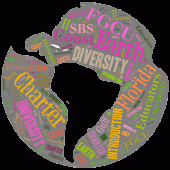
This article describes a collaborative online project that focused on the Earth Charter, particularly on its principles related to diversity. The project was conducted in two online courses of three sections in two colleges at Florida Gulf Coast University (FGCU): the College of Arts and Sciences and the College of Education. One section of twenty-three students in a Composition II course and fifty-four students in two sections of an Introduction to Diversity for Educators course collaborated in mixed teams on a four-stage problem solving project that exposed the participants to a larger community of learners and reinforced shared responsibility for the present and future welfare of the human family and the global community.
Continue Reading
If the concept of sustainability is studied at all in middle or high school, chances are that study is taking place in the science classroom. After all, the topic of sustainability is still widely perceived as one of scientific purview: the melting of the polar ice caps, the increase in storm severity, droughts, flooding, and the like. However, I would like to challenge that assumption, and suggest the topic of sustainability be incorporated more broadly, and by more departments than only biology or geography. I would like to invite my colleagues in the English language arts to take ownership of sustainability education, and more closely examine the roles of the economic and societal factors that are directly related to the environmental degradation of our planet. In this paper, I will provide justification for such an undertaking, and also share my own work on inviting student voice and student experience, along with visual media, into the conversation of sustainability education, and more broadly into the conversation of social justice. I will share, through the work of talented secondary students, why sustainability education is the under the purview of all teachers, not just those in the science department.
Continue Reading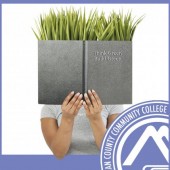
PDF: le Roux Ohm Winter2013 Abstract: Drawing on various dimensions of place, pedagogies of place, and the relationship between place and design, this article presents a case study of place-based learning in a career-oriented higher education program—the Green Building Maintenance and Management program at SUNY Sullivan. This program is rooted in the Catskills, an iconic […]
Continue Reading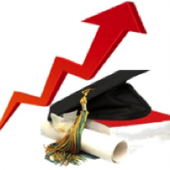
PDF: Maragakis and van den Dobbelsteen Winter 2013 Abstract: The progress of sustainability within higher education has steadily increased in focus over the last decade and has increasingly become a topic of academic research. With various scholars, journals and conferences exclusively dealing with the subject, a wealth of literature has been produced on best practices, […]
Continue Reading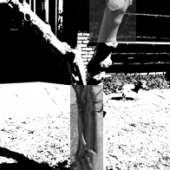
A historic overview, and examination of the curriculum for personal financial literacy suggest that a focus on neoclassical principles results in narrowing consumer understanding of their true power and true impact within a market economy socially and ecologically. Sustainability is taught as an isolated global problem, rather than in conjunction with personal financial literacy, maintaining a misperception that an individual consumer does not have power or influence over global ecological issues. This circumstance perpetuates a situation of what this paper posits as ecological injustice.
Continue Reading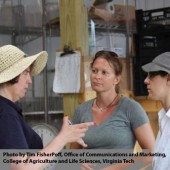
There is evidence that the American agrifood system is a significant contributor to environmental, economic, social, and ethical-animal welfare damage to the earth and to society and is unsustainable, yet the worldview of a substantial percentage of the population conflicts with this assessment. A significant number of researchers, non-governmental organizations, and government entities assert that the detrimental effects of industrial agriculture must be addressed without delay and sustainable agricultural practices implemented. Attempting to change a worldview is not an easy task. A growing body of research in other disciplinary areas suggests that storytelling can serve as an effective method of fostering change. This mixed-methods study examines the role of storytelling in effecting positive change in worldview and attitudes toward sustainable agriculture. The study explores the effects of Story-based versus Information-based treatments on such change. The hypothesis of the study is that Story-based treatments will be more effective in promoting positive change than will Information-based treatments. The findings of the study provide evidence supporting this hypothesis. The story characteristics found to be associated with positive change included: first-hand personal view, vivid description, and identification with the story narrator.
Continue Reading
PDF: Galeshi Winter2013 Abstract: This literature-based report aims to synthesis and summarize the existing research on female’s (meaning adult women and girls) propensity for enrolling and continuing in the science, technology, engineering, and mathematics (STEM) fields at through university level. To create and maintain a sustainable future, it is essential to support females enroll and […]
Continue Reading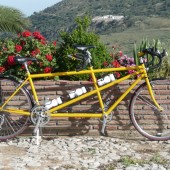
How can curriculum at the post secondary level be used to initiate discussion and reflection for students about current environmental issues and their personal relationship with the natural environment? This is explored through student observations and analysis of personal vehicle use over a four day period. The purpose of the analysis was to engage students in understanding both their personal relationship with and modern societies’ relationship with the private vehicle and the implications of this relationship on the natural environment. The data in this study are from 24 student journals documenting their vehicle use in two winter semesters (2006 and 2007). The results from the journals show five emergent themes relevant to personal vehicle use; time, convenience, freedom, cost and the environment. Within these themes student observations included insights into the challenges associated with changing human behavior towards the natural environment at a local and global level. This paper contributes to the larger discussion about curriculum that engages students in transformative education.
Continue Reading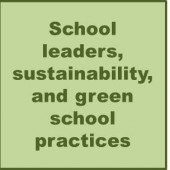
Little research in educational leadership has addressed school leaders, sustainability, and green school practices. State policies requiring green building and management practices are rapidly becoming more common. However, we know little about school leaders’ attitudes, subjective norms, and perceived behavioral control beliefs relative to green school practices. This study begins a line of research investigating the behavioral intentions of school leaders to engage in green school practices. We report on an elicitation study including a diverse sample of 71 U.S. K-12 school leaders’ responses to open-ended survey questions designed following Ajzen’s Theory of Planned Behavior. In general, the study suggests that participating school leaders believe there are benefits to going green and most stakeholders will support greening efforts. However, limited resources (money, time, information, and personnel) present substantial barriers to leading and managing greener schools.
Continue Reading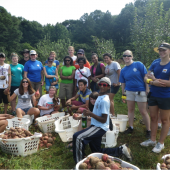
These twenty high school students were part of the first Conservation Leadership in Action Week, an experiential conservation camp hosted by the Tennessee Aquarium and Baylor School in Chattanooga, TN. These ambitious teenagers spent the week discovering conservation challenges, including urban water quality, biodiversity of Tennessee rivers and streams, and how day-to-day actions impact our environment. Sustainable Food Day was a big hit, as students spent the morning on a local farm picking beets. With the help of a local chef, students cooked these beets for dinner that evening. For many, it was the first time they were responsible for their food from farm to table.
Continue Reading